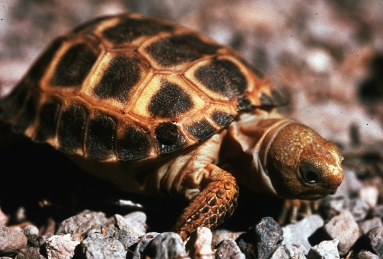|
|
 |
Department of Biology California State University, Northridge 18111 Nordhoff Street Northridge, California 91330-8303, USA Office: (818) 677-5737 FAX: (818) 677-2034 Office Location: Live Oak 1328 Email: raymond.a.hernandez@csun.edu |
|
|
 |
Department of Biology California State University, Northridge 18111 Nordhoff Street Northridge, California 91330-8303, USA Office: (818) 677-5737 FAX: (818) 677-2034 Office Location: Live Oak 1328 Email: raymond.a.hernandez@csun.edu |
Thesis Research
I am studying how herbivory evolves in reptiles. Although reptiles are an ancient and diverse group, few lineages (less than 1%) have evolved this type of dietary specialization. Several omnivorous lineages appear to have the potential for evolving herbivory, yet have not. Perhaps an understanding of the constraints preventing herbivory from evolving in these lineages will provide clues to why herbivory is so rare generally. Recent studies suggest that constraints on the digestive systems (physiological, morphological, or both) of some omnivorous species may preclude them from adopting an herbivorous lifestyle. My project will examine these apparent proximate constraints precluding omnivores from adopting a strictly herbivorous lifestyle while testing a widely held paradigm that major evolutionary shifts (e.g., shifts in diet) evolve in a stepwise manner driven by changes in behavior, followed by changes in physiology, and culminating with changes in morphology. My study species is the omnivorous lizard Pogona vitticeps (bearded dragon). I am raising these lizards on one of three diet treatments (herbivore, carnivore, omnivore) and will compare a series of physiological and morphological characteristics of their digestive systems once they reach sexual maturity. These tests will determine whether changes in diet induce developmental changes in digestive form and function such that they perform like true dietary specialists (i.e., carnivores or herbivores), while elucidating the proximate constraints precluding omnivores from adopting a strictly herbivorous diet. I hypothesis that dragons raised on a diet of plants will exhibit similar physiological characteristics to true herbivores (e.g., increased transport and digestion of carbohydrates), but will be limited in their ability to express morphological changes (e.g., lengthening of the alimentary canal). This limited ability to enhance morphology will translate into lower digestive efficiencies and result in lower growth rates (when compared to omnivores and carnivores of the same species), and thus identify the proximate constraint (selective pressure) for not adopting a strictly herbivorous diet.
Download a copy of my full research proposal here [Hernandez MS Thesis Proposal].
 |
Awards and Honors Research Funding Professional Presentations
Peer-Reviewed Publications
It takes guts to go green: the evolution of herbivory in reptiles
You are what you eat: gastrointestinal constraints on the evolution of herbivory in reptiles
Allometric engineering of the desert tortoise Gopherus agassizii: an empirical test of the minimum body size hypothesis [awarded and declined]